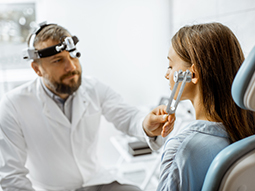The sinuses are hollow air-filled areas within your skull. They connect the space between the nostrils and nasal passage and act like balloons, reducing your skull's weight, allowing you to keep your head upright. They also regulate skull temperature and allow the voice to resonate.
Sinuses are found in the following three pairs:
- Frontal sinuses (in the forehead)
- Maxillary sinuses (behind the cheek bones)
- Sphenoid sinuses (behind the eyes)
The sinuses contain defenses against germs. When you get sick and mucous begins to fill up the sinuses, bacteria may begin to grow. Once the bacteria begin to grow, it may stick to the lining of the sinuses and cause a sinus infection.
Our experts offer specialized care in the diagnosis and treatment of diseases and conditions affecting the sinuses and nose, including:
- Nasal obstruction
- Nasal polyps
- Nasal tumors
- Sinusitis
Nasal obstruction
A nasal obstruction refers to some blockage of the nose or nasal cavity. Common causes of nasal obstruction include:
- Deviated (crooked) nasal septum: The septum is the structure separating your nostrils inside your nose. Symptoms may include difficulty breathing through the nose (especially on one side) and a runny nose. A deviated nasal septum may be caused by trauma to the nose or by rapid growth, especially at puberty.
A person who has a deviated nasal septum that is not treated may have recurrent nosebleeds, difficulty breathing from the nose, and recurrent nasal or sinus infections. If needed, treatment may include medication to treat a runny nose or infection. A nasal steroid may be prescribed. Surgery may be required to straighten a deviated septum when there is no response to medications.
- Inferior turbinate hypertrophy: On each side of your nose are structures called turbinates. They contain a large amount of spongy mucosa (the pink lining inside your nose). The turbinates are very susceptible to allergy and dust irritation. If they become swollen, it can be difficult to breathe through your nose.
A nasal steroid can decrease inflammation of the turbinates. Surgery to shrink the turbinates may be required if there is no improvement with medications.
Nasal polyps
Nasal polyps are small, soft, jelly-like growths consisting of inflamed nasal tissue. No one knows exactly why nasal polyps begin to grow, but certain people seem to suffer from them more commonly, including:
- Asthmatics
- Allergy sufferers
- Patients with chronic sinus infections
- Patients with cystic fibrosis
Your doctor may recommend using a steroid nose spray to slow the polyp growth. Steroid tablets may be prescribed, but those are not a long-term solution, as the steroid has many side effects. Sometimes, surgery is necessary and can be performed on an outpatient basis, if the polyps are small and easily operable.
Nasal tumors
Nasal tumors are benign or cancerous growths inside the nose or nasal cavity. No one knows exactly why nasal tumors begin to grow, but certain people seem to suffer from them more commonly, including:
- Smokers
- Patients with long-term exposure to certain chemicals, fumes, or pollutants
- Patients with a family history of retinoblastoma, a tumor of the eye
Your doctor may recommend surgery to remove the tumor and radiation if the tumor is cancerous. If the tumor is large, an ear, nose, and throat doctor will consult with neurosurgeons on the best approach for surgery.
Sinusitis
Sinusitis, also called rhinosinusitis, is a condition referring to when your sinuses are infected or inflamed. Doctors usually divide sinusitis cases into:
- Acute, which last for four weeks or less
- Chronic, which usually last up to eight weeks but can continue for months, or even years
- Recurrent, which are several acute attacks within a year
Symptoms include:
- Stuffy nose, a feeling that your whole head is stuffed
- Headaches upon waking in the morning
- Pain when tapping on front of your forehead above your eyes
- Pain in upper jaw and teeth
- Swelling of the eyelids and tissues around your eyes
- Pain between your eyes
- Fever
- Drainage of pus through the nose or the back of your throat
Sinusitis can be caused by many things, but it commonly affects allergy sufferers, asthmatics, and people with compromised immune systems. It may be linked to a bacterial infection or a cold that has taken a long time to go away. It has been linked to a possible inflammatory response in some people.
Your doctor may recommend treating your sinusitis with antibiotics, nasal irrigation, and nasal steroids. In cases where sinusitis keeps coming back, called chronic sinusitis, your doctor may recommend surgery.
Our providers

Expert ear, nose, and throat care
Getting the care you need starts with seeing one of our ear, nose, and throat specialists.









